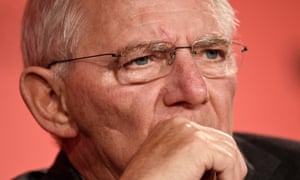Wolfgang Schäuble says that some commitments will still need to be paid for more than a decade after final split

Germany has begun to harden its stance with the UK over Brexit, with its finance minister warning that Britain would face EU budget bills for more than a decade even after severing political ties with the bloc.
Wolfgang Schäuble’s comments will dash Theresa May’s hopes that Berlin would help to soften demands – particularly France’s desire to ensure the UK pays a heavy price for voting to leave the EU.
François Hollande, the French president, is concerned that giving Britain an easy ride could encourage anti-EU forces in France to demand a vote on membership of the bloc.
“Until the UK’s exit is complete, Britain will certainly have to fulfil its commitments,” Schäuble told the Financial Times (paywall). “Possibly there will be some commitments that last beyond the exit … even, in part, to 2030. Also we cannot grant any generous rebates.”
He also warned that the UK must follow international rules on investment incentives in the wake of the post-Brexit commitments given by Downing Street to Nissan. The Japanese carmaker subsequently announced that it will build two new models at its huge Sunderland plant in the coming years.
“These rules apply to all, whether EU members or not,” Schäuble told the newspaper.
At a dinner in Paris attended by Jean-Claude Juncker, EU commission president, and the EU’s top Brexit negotiator, Michel Barnier, in October, Hollande said: “There must be a threat, there must be a risk, there must be a price. Otherwise we will be in a negotiation that cannot end well.”
G20 rules on tax avoidance would limit Britain’s ability to offer tax breaks to companies, even after it left the EU, the German minister argued. He said: “The UK is still a member of the EU and it is a country which has always upheld the valid regulations, valid laws and valid treaties.”
In a blow to Britain’s financial services sector and the prestige of the City, Schäuble backed demands for London to lose its euro-clearing business. He also said the UK should prepare to lose financial services firms to cities such as Frankfurt in the wake of Brexit.
Neither could the UK expect special arrangements on migration if it wanted to remain in the single market. “There is no à la carte menu,” he told the FT. “There is only the whole menu or none.”
He added: “Without membership of the internal market, without acceptance of the four basic freedoms of the internal market, there can, of course, be no passporting, no free access for financial products or for financial actors.”
Even before the 23 June referendum, the finance minister had adopted a hardline stance if British voters opted to leave the bloc.
In an interview with Der Spiegel, the influential veteran politician ruled out the possibility of the UK following a Swiss or Norwegian model that would allow it to enjoy the benefits of the single market without being an EU member.
“That won’t work,” Schäuble said. “It would require the country to abide by the rules of a club from which it currently wants to withdraw.
“If the majority in Britain opts for Brexit, that would be a decision against the single market. In is in. Out is out.”


![[GIST HOUR] Sugar Daddy Wahala [the end] - By Husband Material [GIST HOUR] Sugar Daddy Wahala [the end] - By Husband Material](https://blogger.googleusercontent.com/img/b/R29vZ2xl/AVvXsEjqRO2jkOzGqee-ZzCesVDY8uDGvAy9q3OfBCD5XEtTo1-K4NuhdmD8EZq7k6RXYk7GJAFruobS78fRZcXDbF6vz6dMNmrtgWDn9uFtJ-gOvvNn20cx63hlyNGuQ8PVSx7KtrMZb3gymLY/s72-c/outaroad_sexy_model_of_the_day_Sakara_Ross.jpg)














